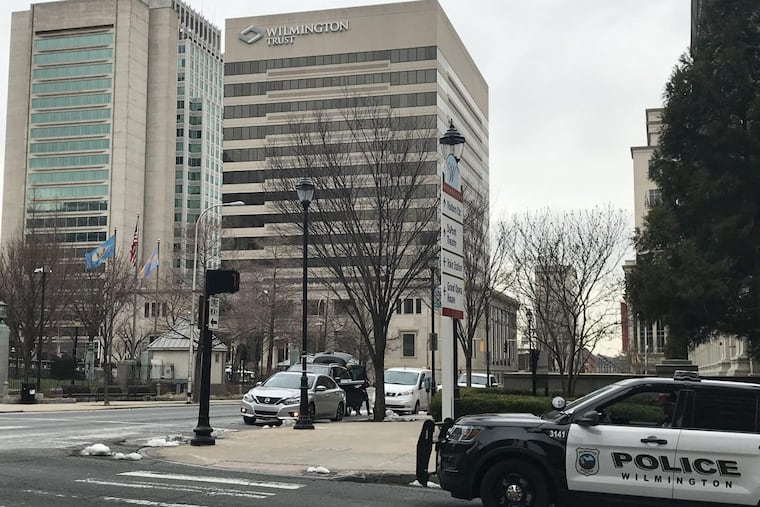More ex-Wilmington Trust bankers sentenced to prison
Two more bankers at what was once the Philadelphia area's largest locally-based bank were sentenced to federal prison for lying about massive loan losses.

A month after four of their ex-bosses were sentenced to federal prison, two former business lenders at what was the largest bank based in the Philadelphia area learned their own prison terms Thursday.
Brian Bailey, head of commercial lending for the bank’s flagship Delaware market, was sentenced to two and a half years and fined $15,000 by federal Judge Richard G. Andrews in Wilmington, WHYY reports. And former lender Peter Hayes was sentenced to 15 months in prison.
Bailey was sentenced five years after he pleaded guilty for his role in obscuring bad loans for failed development projects near the Delaware Shore, and helping his bosses fool shareholders and the federal government into refinancing the bank during the 2008-09 financial crisis, without letting them know how broke the bank really was.
Hayes was sentenced for accepting a bribe from homebuilder Steve Anderson to purchase a couple of homes, in a bid to shore up sales and prices as buyers fled the market.
A series of federal trials in Wilmington and Philadelphia exposed a loose credit and management culture at Wilmington Trust before its financial collapse 10 years ago. The bank, founded to manage assets and transactions for the dominant Pierre S. du Pont faction of the state’s gunpowder and chemical family in 1902, later expanded its tax-shelter business with offices from London to Las Vegas, while beefing up its branch, mortgage, and business lending operations in the Philadelphia area and the Delmarva peninsula.
After the bank acknowledged massive loan losses in 2009 and 2010, regulators forced its sale to M&T Bank Corp., at a big loss to shareholders and retirees dependent on Wilmington Trust stock. The new owner cut 700 staff. M&T and its insurers later paid $40 million to the government and $210 million to shareholders to settle civil claims against Wilmington Trust.
Commercial banks much larger than Wilmington Trust -- including the former First Union Corp., Washington Mutual Corp., and National City Corp., plus investment banks including Bear Stearns & Co. and Lehman Bros. -- were forced out of business in the late 2000s by piles of bad home loans and loan-backed securities. But prosecutors and federal bank regulators say the Delaware-based bank was one of only a few where executives committed felony crimes by lying to investors and regulators about the bank’s true condition.
One more former senior commercial lender at the bank, Joseph Terranova, who pleaded guilty to fraud in 2013, will be sentenced next week, according to WHYY. He had previously helped the government as an informant against his colleagues: Terranova wore a wire to record conversations with Bailey at canasta games, the Wilmington News Journal reported during his bosses' trial.
Bailey and another Delaware banker, James Ladio, had also pleaded guilty to making unauthorized personal loans to one another when Ladio was president of Mid-Coast Community Bank,. Ladio in 2013 was sentenced to two years in prison. Disclosure of his role was followed by the cancellation of his bank’s planned sale to Bryn Mawr Trust Corp.
In 2013, a Main Line-based Wilmington Trust lender, Kevin McAllister, pleaded guilty in federal court in Philadelphia to accepting bribes in exchange for taking kickbacks from a mortgage broker. Two developers were also indicted for their role in frauds against the bank; one pleaded guilty, the other died before his case got to court.
Last month, those bank bosses, former Wilmington Trust president Robert V.A. Harra Jr. and ex-chief financial officer David Gibson, were each sentenced to six years and fined $300,000. Also, chief credit officer William North was sentenced to four and a half years, and controller Kevyn Rakowski was sentenced to three years. Harra’s lawyers immediately announced plans to appeal.
In the late 2000s, bank regulators demanded banks “mark to market” their bad loans, admitting when they had lost value, even if they suspected the loss would be temporary.
Fearing exposure of all the bad loans would force the bank out of business, and hoping the market would recover, Wilmington Trust leaders gambled on hiding hundreds of millions in bad loans. Real estate values in southern Delaware have since recovered, but prosecutors and regulators say that doesn’t mitigate the bankers' crimes.
While a string of former Wilmington Trust leaders are headed to prison, the government hasn’t charged their top boss, former Wilmington Trust Corp. chairman and chief executive Ted T. Cecala. U.S. Attorney David Weiss told reporters last year that sometimes prosecutors end up leaving a suspected “kingpin” uncharged in order to make cases against underlings they believe they are more likely to win.
Cecala’s former lawyer, Colm Connolly, best known in Delaware for winning the murder conviction of Saul Ewing law firm branch chief Thomas Capano for killing then-Gov. Tom Carper’s scheduling secretary, Anne Marie Fahey, has been named a federal judge by President Donald Trump.